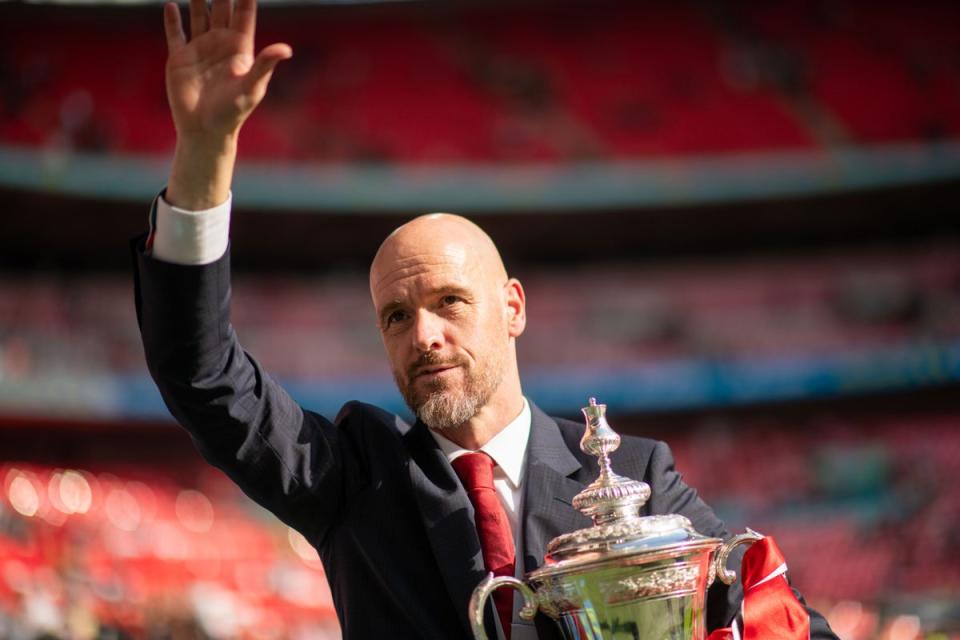Why Manchester United must sack Erik ten Hag despite FA Cup success
If, as many reports suggested, Manchester United had already made the call to move on from Erik ten Hag ahead of Saturday’s FA Cup Final, regardless of its result, there really could be no grumbling with either the timing or rationale.
Even this morning, the latter speaks for itself; the club’s worst-ever Premier League finish — eighth with a negative goal difference — paints a far more accurate picture of a season of regression than its redemptive final 90 minutes and a trophy lift.
It might have been regrettable for the apparent verdict to find its way, as most ‘inside information’ at Old Trafford seems to, into the public domain ahead of such a big game, but last week surely was the right time to be making clear-eyed, sober decisions on the campaign and its conductor as a whole, before the emotion of either success or the thumping by Manchester City most expected could happen.
The challenge now, then, for Sir Jim Ratcliffe, Sir Dave Brailsford and the rest of the INEOS football operations taskforce will be in sticking to their guns.
Will they show the same lethal streak as when canning an entire club and its staff’s end-of-season do for the sake of ensuring a three-course meal did not take the first-team focus off the FA Cup prize, or will they be wooed by Saturday’s triumph and what appears to be warming fan sentiment towards the idea of Ten Hag staying on?
As reports emerged over the weekend of talks with Mauricio Pochettino, Roberto De Zerbi and Thomas Frank, a survey by the Manchester Evening News had 78 per cent of supporters keen to stick and not twist, up from 39 per cent less than a month ago. Standing by Ten Hag, it seems, might provide owners yet to convince with an easy PR win among match-going fans.
It might also prove a catastrophic error of judgement. After the relative success of Ten Hag’s first season in charge, when United won the League Cup and finished third in the Premier League, by virtually every metric the 54-year-old’s side have gone backwards in his second.

United won five fewer games this season than in 2022-23 and lost five more. Defensively, in particular, they were shambolic, goals conceded in both expected and real terms up by more than a third and league clean sheets down from 17 to just nine.
The statistic of shots faced became the weekly barometer of woe: by season’s end, the count stood at a ridiculous 667, almost 200 more than a year ago.
Often, when United won, it looked unsustainable; when they lost, it seemed just desserts. Put simply, the underlying numbers have it as a quirk that the club’s worst-ever Premier League season was even as good as it was.
Ten Hag is right to point to the injuries his side suffered, particularly in defence, but wrong to lay the blame exclusively at that door. Other teams, like Newcastle, have coped far better with similar misfortune.
Ten Hag is right to point to the injuries his side suffered, but wrong to lay the blame exclusively at that door
Persisting with Casemiro at centre-back and refusing to bolster a porous midfield sooner was simply poor management of available resource.
Integrating players such as Alejandro Garnacho and Kobbie Mainoo will be Ten Hag’s greatest legacy. Ironically, though, it has been necessitated by some horribly misguided recruitment: not one of his four most expensive signings — Rasmus Hojlund, Mason Mount, Casemiro and Antony — was picked to start at Wembley.
“We are exactly where we want to be,” a defiant Ten Hag said in a post-match press conference that gave little indication its subject had just won a second trophy in as many seasons. United as a club, though, are clearly not — and that disconnect is surely why he must go.


